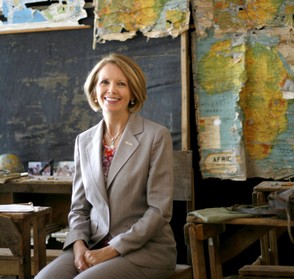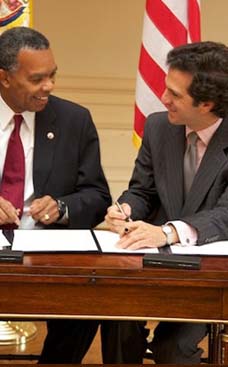
She was just 3 when her parents and family emigrated from Ireland to the United States. Her father, a brick mason, was among those who later built the Twin Towers of the World Trade Center. "They'd both had to leave school when they were 13, but seven of their eight children went to college here. We couldn't have done that in Ireland," she said. "My parents gave us the capacity. The United States gave us the opportunity." For her, opportunity meant leaving the tough North Jersey town of Kearny for college in Massachusetts, spending a couple of years as a social worker focused on child protection issues and then volunteering for the Peace Corps. Back in the U.S. after working as a Peace Corps volunteer in a remote north Kenyan village, she earned a master's degree in public health. But then she headed right back to Africa, to desperately poor Somalia to work with the U.S. Agency for International Development and the National Refugee Commission. "I've lived 18 years in developing countries, and I learned that people from every culture, in every country, want better lives for their children," she said. "They want their children to have a future."
Kenya RPCV Anne Goddard helps lead ChildFund in a new directon
Executive helps lead ChildFund in a new directon
Credit: TIMES-DISPATCH
ChildFund International CEO Anne Goddard is helping the organization develop new ways to help children.
By DAVID RESS | TIMES-DISPATCH STAFF WRITER
Published: July 12, 2010
Richmond, Va. --
The semicircle of teens, sitting in their old classroom in the orphanage, were bursting to tell their American visitor how it felt to be in a regular school, playing sports and singing in the choir.
For Anne Goddard, chief executive of ChildFund International, the foster children in Belarus were reminders of lessons learned in her first job out of college, as a social worker in Massachusetts: Children do better in homes than in institutions.
After a bit, their foster parents arrived.
"I remember one gentleman, probably in his mid-50s. A ruddy face, the kind you get working outdoors all the time," she recalled. "He said, 'My kids are grown now, and it is so nice to have a child in the house again; he's just like my own. . . . But I'm a better parent now than I was.'"
The comments are a confirmation for Goddard that her seven-decades-old Henrico County-based agency is on the right track, thinking in new ways about the needs of children.
In Belarus, it meant helping to set up a foster-care system in two cities where there'd been a huge increase in the number of young people in orphanages caused by an epidemic of adult alcoholism.
ChildFund helped the government there begin the kind of assessment and screenings Goddard did as a young social worker.
But the agency also took the extra step of running three- to four-month training programs for foster parents and foster children, helping both adults and children prepare for what's often a difficult transition from institution to home.
"At ChildFund, we like to say what we do is about capacity and about opportunity," she said.
. . .
She knows something about both.
"My first memories are from the boat, coming over," she said.
She was just 3 when her parents and family emigrated from Ireland to the United States. Her father, a brick mason, was among those who later built the Twin Towers of the World Trade Center.
"They'd both had to leave school when they were 13, but seven of their eight children went to college here. We couldn't have done that in Ireland," she said. "My parents gave us the capacity. The United States gave us the opportunity."
For her, opportunity meant leaving the tough North Jersey town of Kearny for college in Massachusetts, spending a couple of years as a social worker focused on child protection issues and then volunteering for the Peace Corps.
Back in the U.S. after working as a Peace Corps volunteer in a remote north Kenyan village, she earned a master's degree in public health. But then she headed right back to Africa, to desperately poor Somalia to work with the U.S. Agency for International Development and the National Refugee Commission.
"I've lived 18 years in developing countries, and I learned that people from every culture, in every country, want better lives for their children," she said. "They want their children to have a future."
That's been ChildFund's mission since 1938, when Richmond pastor J. Calvitt Clarke founded the China's Children Fund with a $2,000 donation, quickly followed by $13,000 to support a school and an orphanage.
For decades, the agency, long known as the Christian Children's Fund, brought American sponsors together with needy children overseas.
Sponsorship is still at the heart of what ChildFund does.
"This spring, I was with some staff, driving out of Nairobi, and a policeman pulled us over," Goddard said. "Well, I speak Swahili, and I could hear him talking about the 'mzungu' in the back seat, and, like a cynic, I thought, well, he's just looking for a bribe because the foreign woman's in the car. . . .
"But it wasn't that. He was one of the children we'd sponsored. We'd sponsored him for 12 years. He said his family was so poor, he'd never have had the chance to go to school," she said.
"He saw the logo on the side of the car and wanted to say thank-you," she said. "Now, he's married, he has two kids of his own, and he's helping the people of his country -- a policeman -- contributing."
. . .
ChildFund, though, is doing a lot of other things these days as well.
A few years before Goddard became ChildFund's eighth president in 2007, the agency did a different kind of study about poverty, taking the unusual step of asking children what poverty meant.
The answer was not just the deprivation that their parents spoke of -- the lack of food or good clothing or decent shelter.
The children made that point, too. But they also spoke of poverty as meaning exclusion, being shut out of things. And they spoke of it as vulnerability.
The teens in Belarus knew both feelings well.
Being in an orphanage meant being shut out from the rest of their community. They were in the orphanage because they were vulnerable. The child abuse that went along with rising alcoholism was why officials wanted to shelter the kids in an institution.
Exclusion came up in a different way during Goddard's trip last year to Wattuga sub-county, Uganda.
Goddard talked to some teenagers involved in one of ChildFund's micro-finance pilot programs.
The idea -- another new direction for the agency -- is that in countries where 85 percent of people work for themselves, children out of school may need a bit of help learning to earn a living and getting ahold of the tiny amount of capital they need to get started.
The Ugandan teens -- nine boys and three girls, orphaned by AIDS -- had a good idea: They sold "green," or environmentally friendly, stoves.
In that isolated village in north Uganda, women basically cooked on fires inside their houses, bending uncomfortably as they balanced pots on three rocks. The fires used lots of wood, a lot of which went up in smoke.
The teen orphans' business is building stoves.
They use a few bricks as a base and then build a clay-and-straw enclosed structure, with a chimney to vent the smoke and a waist-high surface for the pots.
"One of the things they liked was that it was a way to spend time together. In that village, when they left school, they were isolated," she said. "Building stoves brought them together for a couple of days a week, and that was something important to them."
It brought them money, too. Not a lot.
"They were doing this with zero risk," Goddard laughed. "They'd find their customers and have them buy the bricks -- that was the only expense. Then they'd build the stove and be paid for their work."
. . .
One reason Goddard may like that story is that she thinks about bottom lines, too.
"There's the financial bottom line. And there's the social one, the one about what you have accomplished," she said.
That's why, she said, one of the key initiatives of her time at ChildFund has been to focus on beefing up monitoring of what impact the agency is having.
It's a lot more than the old-style annual reports to sponsors these days. In Ecuador, the agency is piloting a website in which the kids themselves report to sponsors and ChildFund.
And Goddard has pushed for more detailed, science-based reports about the progress of individual children and of the communities in which they live.
"We want to know if we're having an impact on children in a community, on how children generally are doing there," she said.
Those reports go to the communities, too. The feedback from the communities shapes where ChildFund goes in the future with the wide range of programs that focus on everything from school to nutrition for young children to prenatal care and maternal health.
Dr. Charles M. Caravati Jr., chair of ChildFund's board, said he's impressed with how carefully Goddard gathers facts, listens to advice and presses ahead to make hard decisions.
"That's kind of a new thing in our world," he said. "She's one of the most energetic, dedicated people -- she's passionate about the welfare of children."
But there's more to her approach to leadership than that, people who know her say.
"I've seen her very passionate about what we do," said Robert F. Norfleet Jr., retired senior credit officer of Crestar Bank (now SunTrust Banks) who serves on ChildFund's board.
He has "seen her sitting down on a dirt playground in southern Mississippi and playing with the kids," he said, recalling a trip last year to some ChildFund programs there.
"She's comfortable helping little children and being with the people who are trying to help them, no matter where they are."
. . .
There are lots of new ideas, lots of needs and lots of answers.
But old ones still work, too, Goddard said.
On a recent trip to Uganda, John Kulu, a young man who had been a sponsored child, accompanied Goddard's team. Sponsorship meant everything from shoes for him to permanent classrooms for his impoverished village.
"He is a lawyer, and he told me, sometimes when he is arguing before his country's Supreme Court, he remembers that he never would have thought he would do anything like that," Goddard said.
"Americans know the needs of the developing world. Sometimes they think that one person can't make a difference, that what they can give doesn't make a difference," she said. "But it does."
Contact David Ress at (804) 649-6051 or dress@timesdispatch.com.












